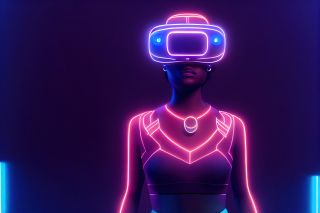When Mark Zuckerberg announced that he was changing his company’s name from Facebook to Meta and focusing on virtual reality (VR) and other immersive technologies, enthusiasts of metaverse-related technology were excited.
The event brought enthusiasm and media attention to metaverse technology both in and outside of the classroom as well as investment opportunities. Meta funded Metauniversities and developed popular VR and Metaverse-ready technology such as the Meta Quest 2.
However, the pivot to the metaverse has seemingly not gone well for the company formerly known as Facebook. Beginning in late 2022, Meta started laying off thousands of employees. When OpenAI released ChatGPT, generative AI stole the metaverse’s thunder as the “it” technology of the moment.
“There was a lot of talk about dumping money into metaverse development, then along came OpenAI in November, and I think that changed a lot of the funding strategies,” says Kathryn Hirsh-Pasek, the Stanley and Debra Lefkowitz Faculty Fellow in the Department of Psychology at Temple University and a Senior Fellow at the Brookings Institution.
Funding once devoted to metaverse development has been diverted to AI research and some sources say that even Meta – contrary to what its name implies – is no longer all-in when it comes to the metaverse.
However, that doesn’t mean the dream of a metaverse-centric education is dead. In fact, Hirsh-Pasek and other metaverse-in-education enthusiasts believe the emergence of AI will help the metaverse in the long run.
AI is A Good Thing for The Metaverse
Jaime Donally, a well-known immersive learning expert, believes generative AI technology will ultimately bring the metaverse into the mainstream by providing everyone, including students, with the ability to quickly create immersive worlds.
“The metaverse is picking up steam with generative AI rather than dropping in interest,” Donally says.
In addition, the concept of the metaverse was always bigger than one company and the very idea that one company could build the metaverse is flawed. “That's not what the metaverse is going to be, that's not the definition of the metaverse,” she says. “Everybody's making their own products and that's fine, but the vision of the metaverse is when they're all intertwined. They're all connected. They're decentralized.”
Donally believes metaverse will be helped by Apple announcing it will get into the immersive technology game by offering its own VR/AR headset, which could be released soon.
Even so, many resources in tech have switched focus to AI, which could slow down metaverse development. However, that’s not necessarily a bad thing, Hirsh-Pasek says.
“If we halt the rush to market and actually figure out how to do this in a way that is both educational and safe, and equitable, then I think the metaverse can be a product that can take kids to ancient Greece rather than have them reading about it,” she says. “It can show them what it's like to walk on the moon and to make discoveries on their own. So it could give kids tremendous agency in their own education. If we can design it correctly, and not just make it another way to see a movie.”
The Metaverse Today
Phil Hintz, director of student information at the Barrington 220 School District in Illinois, is studying how metaverse-style immersive technologies can be used to teach students with intellectual disabilities. “The metaverse is very much a place to practice and get good at any skill, whether it's a life skill or occupational skill,” Hintz says. “It's a sandbox to try something out that you might then carry back into reality.”
Hirsh-Pasek says current technology has not yet advanced enough to reach the full potential of the metaverse as the equipment remains expensive and sometimes clunky. As that technology inevitably continues to improve, she hopes the education standard does as well and that more companies invested in the technology will work with developmental psychologists on their products.
“There are tons of us, and we would be happy to work with you to make sure that intentionality and best educational practice is built into your system,” says Hirsh-Pasek.
As important as thinking about the future of the metaverse and immersive technology can be, Donally sometimes believes the potential of tools that are available right now get overlooked.
“Yes, we need to be forward-thinking and we don't need to be stuck on any tools, but today there are incredible tools that aren't being leveraged in the classroom,” she says. “That's the unfortunate part, they think they're waiting for something when really that something is already there, available today.”
- The Metaverse: 5 Things Educators Should Know
- VR in Education: Potential and Barriers for Effective Use
- What Is Virtual Reality?
To share your feedback and ideas on this article, consider joining our Tech & Learning online community here
